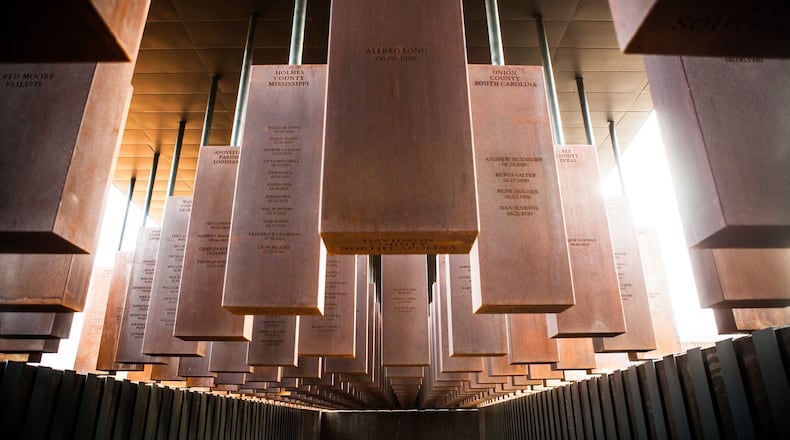DeKalb County commissioners on Tuesday took a forceful step to reckon with the legacy of racial terror in the county as they approved placement of a historical marker to lynching victims near the town square in Decatur.
All told, 592 Georgians were lynched during the period from 1877 to 1950, the second most of any state during the Jim Crow era, according to data from the Equal Justice Initiative, a Montgomery-based organization that is sponsoring the marker.
Fulton County had the most lynchings in the state with 35 and DeKalb had four known lynchings, according to the group’s database. The marker, which will be unveiled during a weeklong celebration in September, will be placed outside the county courthouse.
The commission's resolution describes the murders as "racial terrorism" that created lasting effects on African-Americans that continue today.
“We’re getting them as symbolically close to justice after death as we can,” DeKalb NAACP member D. E. Smith said of DeKalb’s known lynching victims.
Members of the NAACP began working on what they call the DeKalb Remembrance Project shortly after returning from a trip this summer to the National Memorial for Peace and Justice in Montgomery, Ala, which was spearheaded by the Equal Justice Initiative (EJI). The museum provides a haunting panoramic of the nation's history of lynchings and racial injustice.
The marker’s location outside the county courthouse in downtown Decatur places it near a controversial Confederate monument located on adjacent property of the old courthouse.
DeKalb commissioners have tried unsuccessfully to relocate that 30-foot obelisk erected in 1908 as an ode to Confederate soldiers. Its inscription praises men who "were of a covenant keeping race."
However, no group would to take ownership of that monument, and state law prohibits hiding it away or destroying it.
The Montgomery-based organization is partnering with local governments and groups across the country to place public markers that document lynchings in their communities. The group placed a marker in LaGrange in March 2017 in a ceremony where over 100 people attended, including relatives of two lynching victims. The Equal Justice Initiative reported that it was the first time either man's death had been acknowledged publicly, and the mayor of the city issued a formal apology.
DeKalb NAACP president Teresa Hardy said she will spend upcoming months working with community partners to raise money for Remembrance Week events that in addition to the marker unveiling will include performances, an essay contest whose winners receive scholarships and educational programs.
Hardy was among the NAACP members who visited the museum last summer. The deaths of more than 4,000 victims of racial violence are honored by a series of 800 steel monuments, one for every U.S. county where a lynching occurred.
When the museum opened in April, the Equal Justice Initiative simultaneously presented a challenge to every county depicted on one of the monuments. There is a copy of each six-foot, coffin-shaped module lying in a field surrounding the museum waiting to be claimed.
Smith said the goal is to eventually bring that monument to downtown Decatur, too, but the Equal Justice Initiative is still finalizing that process. However, the NAACP members found the replica during their trip to Montgomery and placed a vase of yellow flowers on its face.
“Those who went came back determined to lead by example in doing this work here in DeKalb,” Hardy said. “Since then, we continue to grow a broad-based community coalition in pursuit of this project. We’re ready to look back and move forward together.”
About the Author
Keep Reading
The Latest
Featured




